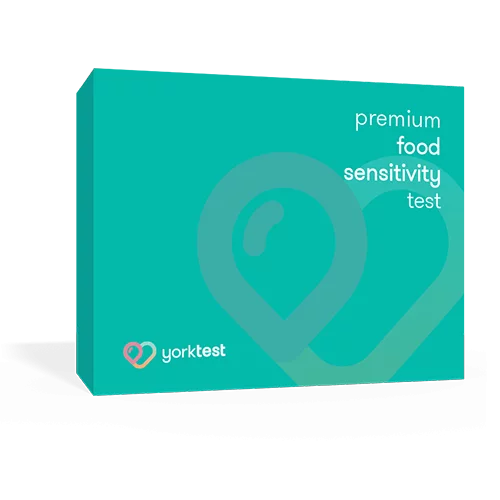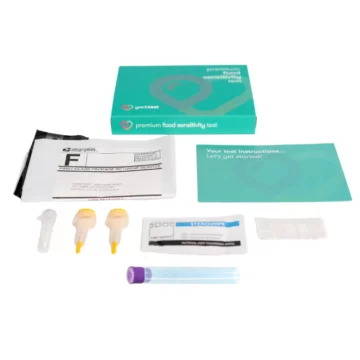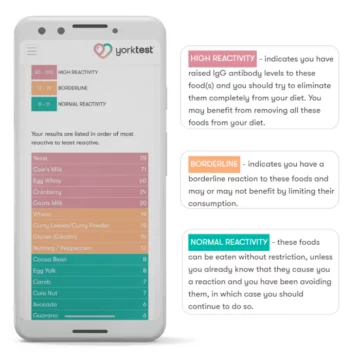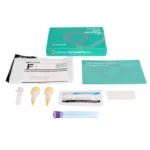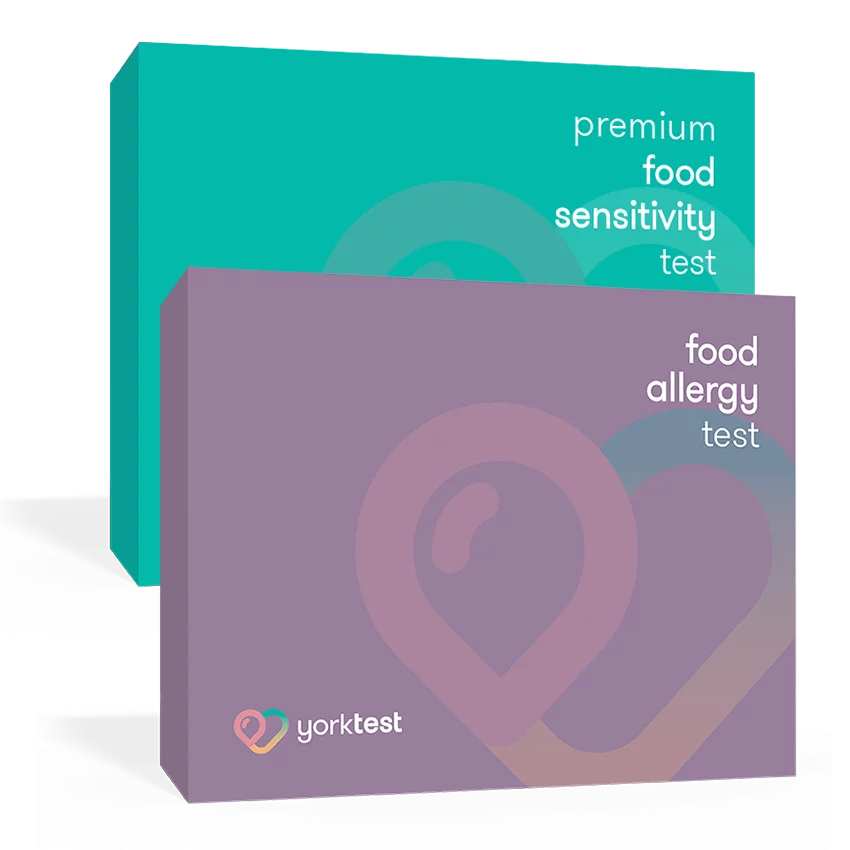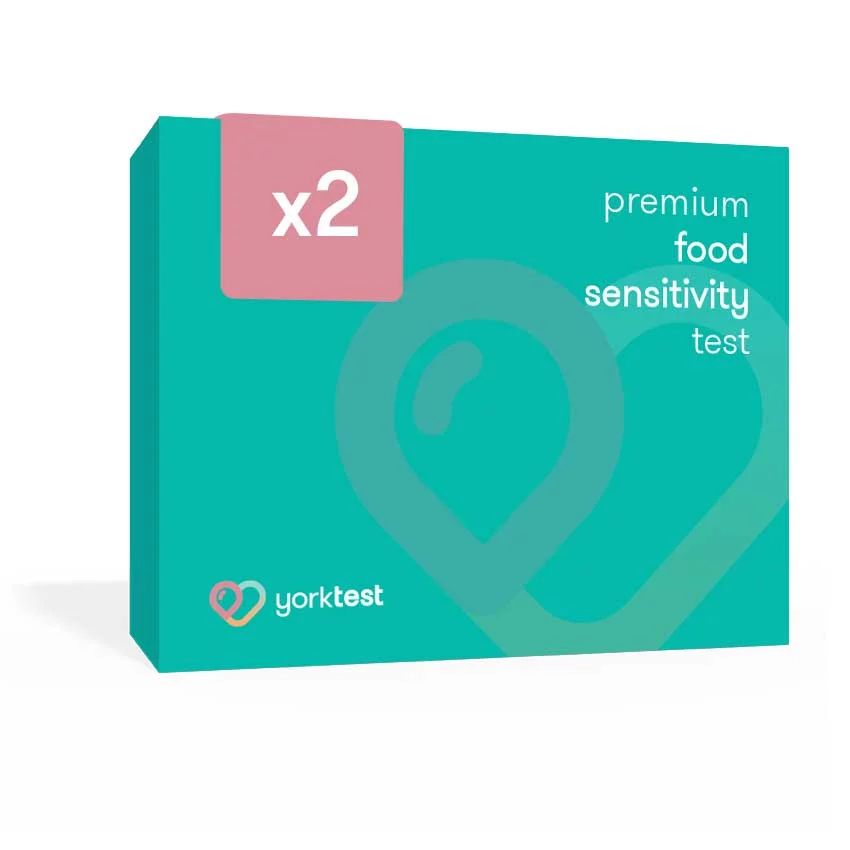1x Premium Food Sensitivity Test Test
added to basket
Upgrade your product to our Nutritional Therapist Consultation Test
Premium Food Sensitivity Test
$132
30% OFF SALE ENDS SUNDAY
FREE shipping on all orders
The Premium Food Sensitivity Test measures your IgG reactivity to 200 foods and drinks. Get answers on which foods could be triggering your IBS symptoms, headaches, bloating, tiredness, and more. Simply collect your finger-prick blood sample at home. Mail it to our laboratory for testing. Then receive your results online within 7 days!
- 200 ingredients tested
- Tests are HSA and FSA accepted
- Analyzed in our accredited laboratory
- Clear, color-coded results show your IgG reactivity score for each ingredient
Customers must be aged 18 years or over to take this test. For under 18s, take our Junior Food Sensitivity Test. This test is not available to customers who are pregnant or breastfeeding.
Take Control Of Your Gut Health
70% of your immune system is in your gut. When you eat a food that you are sensitive to it triggers an IgG antibody immune response. Your body mistakes the food as a threat and works overtime to defend itself. This can lead to symptoms across the whole body – not just in your gut.
Food sensitivities have been linked to everything from IBS, bloating, and weight changes through to headaches, skin conditions, and fatigue.
Symptoms can take up to 3 days to appear, and multiple foods or drinks can be involved in a reaction. This makes it almost impossible to guess which ingredients are causing you problems without testing.
IDENTIFYING YOUR TRIGGERS
Taking a food sensitivity test allows you to accurately identify the foods triggering an IgG response. You may then choose to safely trial removing your high reactivity foods from your diet, which may help to reduce immune load and contribute to gut healing. We recommend that you speak with an expert Nutritional Therapist or your medical practitioner before eliminating any foods.
Thousands of people have seen success following this YorkTest method:
- 84% of IBS sufferers reported improvements
- 87% of people with fatigue felt benefits
- 93% saw improvements in their mood
Results from a sample of 3,026 people.


4 Simple Steps to a Healthier You
What's in the test?


What’s In Your Food Sensitivity Testing Kit
Your food sensitivity testing kit contains everything you need to collect your blood sample in the comfort of your home, then ship it back to our laboratory for analysis.
- A return envelope (no shipping costs)
- Two single-use lancets
- One absorbent wand
- One absorbent wand container (keeps the wand clean before use)
- One larger container (protects your sample during return shipping)
- One adhesive bandage
- A cleansing wipe
Every test starts and ends its journey at our own laboratory. By managing everything in-house – from dispatching your kit to processing your blood sample and providing ongoing customer support – we fully safeguard the stability and security of your sample.
Personalized Results Within 7 Days
You will receive a personalized report showing your IgG reactivity to each of the 200 ingredients tested. This report is accessed by logging into your secure Wellness Hub account. We will send you an email letting you know as soon as your results are ready.
EASY TO UNDERSTAND
Your results are listed in order of most reactive to least reactive.
- RED = High reactivity
- AMBER = Borderline reactivity
- GREEN = Normal reactivity
This makes it easy to pinpoint the foods you should prioritize for an elimination diet, if appropriate.
ACTIONABLE INSIGHTS
You will also receive a comprehensive Guidebook, plus a Food & Drinks Diary, to guide you on your next steps.
EXPERT NUTRITIONAL SUPPORT
To help get the most from your food sensitivity results and make any dietary changes as easy as possible, we recommend that you order a Nutritional Therapist Consultation. This gives you a 30-minute telephone appointment with one of our registered Nutritional Therapists.
What We Test For
Key Ingredients
- Almond
- Beef
- Coffee
- Cow’s Milk
- Egg White
- Egg Yolk
- Gluten (Gliadin)
- Oat
- Peanut
- Pork
- Tea
- Wheat
- Yeast
Drinks
- Acai Berry
- Chamomile
- Coffee
- Cow’s Milk
- Dandelion Root/Burdock Root
- Elderberry/Elderflower Mix
- Ginseng
- Goat’s Milk
- Cabernet Sauvignon
- Chardonnay
- Concord
- Chenin Blanc
- Malbec
- Merlot
- Pinot Noir
- Riesling
- Sauvignon Blanc
- Syrah/Shiraz
- White Zinfandel/ Red Zinfandel Mix
- Green Tea
- Guarana
- Hibiscus
- Nettle
- Rooibos
- Rosehip
- Sheep’s Milk
- Tea
Fish/Shellfish
- Abalone/Cuttlefish
- Anchovy
- Crustacean Mix
- Eel
- Mollusc Mix
- Oily Fish Mix
- Plaice/Sole
- Salmon/Trout
- Sardines
- Tuna
- Vendace
- White Fish Mix
Fruit
- Apple
- Apricot
- Avocado
- Banana
- Bilberry
- Blackberry
- Blackcurrant
- Blueberry
- Boysenberry
- Cherry
- Cloudberry
- Coconut
- Cranberry
- Cucumber
- Grape
- Grapefruit
- Kiwi
- Lemon
- Lime
- Lingonberry
- Lychee
- Mango
- Melon Mix
- Mulberry
- Olive
- Orange
- Papaya
- Peach
- Pear
- Pineapple
- Plantain
- Pomegranate
- Prune
- Pumpkin
- Raspberry
- Strawberry
- Tamarind
- Tomato
Grains
- Barley/Malt
- Corn (Maize)
- Dinkel Flour
- Gluten (Gliadin)
- Hops
- Millet
- Oat
- Quinoa
- Rice
- Rye
- Wheat
- Wheatgrass
Herbs and spices
- Agar Agar
- Anise Seed
- Cassia
- Cardamom/Bay Leaf
- Chilli Pepper
- Cinnamon/Clove
- Coriander/Cumin/Dill
- Curry Leaves/Curry Powder
- Garlic
- Ginger
- Jasmine
- Juniper berry
- Lemongrass
- Mint Mix
- Mustard Seed
- Nutmeg/Peppercorn
- Peppers (Capsicum)/Paprika
- Parsley
- Turmeric
Meat
- Beef
- Chicken
- Duck
- Goat
- Lamb
- Pheasant
- Pork
- Turkey
Nuts and plants
- Agave
- Almond
- Aloe Vera
- Bamboo
- Brazil Nut
- Carob
- Cashew Nut
- Chia Seed
- Chickpea
- Cocoa Bean
- Cola Nut
- Flax/Linseed
- Hazelnut
- Hemp
- Lotus Root
- Nettle Leaves
- Okra
- Peanut
- Rocket (Arugula)
- Sesame Seed
- Seaweed
- Spirulina
- Sunflower Seed
- Tamarind
- Walnut
Vegetables
- Asparagus
- Eggplant
- Bean sprouts
- Beetroot
- Bok choi
- Carrot
- Celery
- Haricot Bean
- Kidney Bean
- Lentils
- Lettuce
- Mushroom
- Mustard Mix
- Onion
- Parsnip
- Pea
- Peppers (Capsicum)
- Potato
- Rhubarb
- Soybean
- Spinach
- String Bean
- Swede
- Sweet Potato
- Turnip
- Water Chestnut
Individual Content of Mixes
Crustacean Mix
– Crab
– Lobster
– Prawn
– Shrimp
Melon Mix
– Watermelon
– Honeydew
– Cantaloupe
Mint Mix
– Mint
– Sage
– Basil
– Thyme
Mollusc Mix
– Mussel
– Oyster
– Scallop
Mustard Mix
– Broccoli
– Brussel Sprouts
– Cabbage
– Cauliflower
Oily Fish Mix
– Herring
– Mackerel
White Fish Mix
– Cod
– Haddock
Food Sensitivity Test FAQs
What is a food sensitivity test?
If you want to know what might be causing symptoms such as IBS, headaches, bloating or tiredness, then a food sensitivity test could help. Food intolerances can develop at any time.
At YorkTest, we define food sensitivity, and food intolerance testing, as looking for any food-specific IgG reactions in the body. IgG is an antibody called Immunoglobulin G.
It’s a little bit different from food allergy testing, which searches for a different antibody response that causes an allergic reaction.
Our at home food sensitivity tests check to see how your immune system reacts to different food groups, looking for those IgG reactions.
Every test is different but at YorkTest, we analyze IgG reactions to 200 food and drink ingredients. With so much data, you might be surprised to learn which foods trigger your immune system’s response – while groups such as dairy and wheat are commonly known, the foods you react to could be fruit, fish, or even that herb that you can’t resist adding to every dish.
Once you’ve taken a food sensitivity test, you’ll be able to understand which types of food cause your body to have an adverse immune response, triggering uncomfortable symptoms such as nausea or gas.
How does our at home food sensitivity test work?
We send out a kit to collect your sample, before running tests in our laboratory to get the results.
It’s easy to take the test. Once you place your order, we’ll mail a kit out to your address, along with its instructions. We’ll aim to mail the kit either the same day or the next working day.
In each kit, you’ll find a cleansing wipe for your finger, two lancets (single-use), an absorbent wand, a secure container for the wand. Use the kit to gently prick your finger to collect a blood sample – the process is little more than a scratch, we promise!
Your sample can be registered on our Wellness Hub, and just send it back to us in the mail.
When we receive your test, we get to analyzing and processing it in our laboratories. As part of our food intolerance testing, we search for any food-specific IgG reactions in the body – IgG is an antibody called Immunoglobulin G, and it can show when your body is responding adversely to a substance, which can result in uncomfortable symptoms.
Your results will be available through our Wellness Hub, along with guidance to help you take back control of your health and wellbeing. You will then be able to book a consultation with a qualified Nutritional Therapist.
How accurate are food sensitivity tests?
At YorkTest, we define food sensitivity, and food intolerance testing, as looking for any food-specific IgG reactions in the body. IgG is an antibody called Immunoglobulin G. After collecting your sample, we run tests in our laboratory to see which foods are causing any IgG reactions.
The reproducibility rate of our tests is over 98%. This means that when we take the same person’s sample and run the same tests, the results will correlate with each other more than 98% of the time.
We test for all four subtypes of IgG, analyzing your sample for reactions to 200 food and drink ingredients. This reduces the risk of any reaction being missed.
As well as being highly accurate, you can have peace of mind when reading the results of your food sensitivity test, knowing that so many foods have been tested.
What are the most common food sensitivities?
Depending on your personal food fingerprint, you could be sensitive to pretty much anything from chickpeas to beef – this is why taking a food sensitivity test is so important to help you identify the cause and help reduce the symptoms. However, there are certain products that are more common on the results of our food intolerance test reports for our customers. You can view the full range of what we test for in the section above.
According to Very Well Health, here are a number of commonly-identified food sensitivities:
Gluten: Used in many baked goods, and is also in lots of sauces and gravies. Being sensitive to gluten is different to having celiac disease, which is a lifelong autoimmune condition. Learn more about what gluten is and why it is bad for some people over on our blog.
Nuts: Being sensitive to nuts doesn’t necessarily mean you are allergic to them. Allergies can often cause very severe reactions so it’s important to take a specific food allergy test to identify any risk.
Nut sensitivity symptoms can still be uncomfortable, and according to our research, can also take up to 72 hours to show. Lots of people experience peanut sensitivities specifically – which are technically classified as legumes or tree nuts – but you could have an intolerance to nuts as well.
Dairy: Symptoms can flare when the body doesn’t have enough lactase (an enzyme) to digest the sugar from lactose found in dairy products. The food-specific IgG test does not test for lactose intolerance, but it does test for reactions to a product called casein also makes dairy hard to digest and can lead to food sensitivity symptoms.
If you love coffee but have a dairy intolerance, there are lots of dairy-free alternatives to milk to choose from. However, many people also are sensitive to the proteins in the caffeinated drink, so it’s good to take a test before eliminating anything from your diet.
High FODMAP foods: FODMAPs are a group of carbohydrates: fermentable oligosaccharides, disaccharides, monosaccharides and polyols.
High FODMAP foods can be harder for your body to digest, which can lead to discomfort such as bloating. Research has shown that eliminating triggering FODMAPs from your diet can help with alleviating IBS symptoms.
We listed some high FODMAP foods and low FODMAP alternatives on our blog.
What symptoms do food sensitivities cause?
Food sensitivities can cause a wide range of uncomfortable symptoms.
Because food intolerances are linked to your gut health, many people know that if they’re suffering from digestive complaints or even nausea then they might be sensitive to certain foods. However, the list of symptoms is much longer.
Lots of people will experience joint pain due to their lifestyle or simply growing older. But it could also be due to a food sensitivity, exacerbated by your body’s immune system targeting your joints and causing them to swell.
Other aches and pains such as regular migraines or headaches could also be triggered by specific foods – as well as food intolerance testing, it’s important to seek advice from your medical practitioner to rule out any underlying conditions.
Fatigue and tiredness could also be caused by dips in energy levels caused by specific foods. Food intolerances can sometimes make it more difficult to maintain a healthy weight too
Conditions such as eczema and asthma are caused by an overactive immune system. Identifying your specific food triggers using a food sensitivity test could help to manage the immune response and reduce the symptoms. Even if you have less severe skin irritation or respiratory problems, knowing the food triggers can help you to avoid them.
Anxiety and depression are complex mental health conditions and you should always seek help from a medical practitioner. As part of your treatment, understanding what foods cause uncomfortable symptoms could impact your daily wellbeing. We explain more about the science of the role diet has on mood in our blog post.
Who can take this food sensitivity test?
If you regularly experience symptoms such as stomach cramps, headaches, nausea, tiredness or uncomfortable, itchy skin, then a food trigger could be the cause.
Anyone suffering from any of these complaints can take this at home food sensitivity test. It’s a simple way to try and identify which types of food could be linked to your body’s reactions.
Our test analyzes IgG reactions to 200 food and drink ingredients. With this information, you can start to eliminate those foods from your diet to try and reduce the risk of discomfort.
All of our customers have the option to add on a 30-minute consultation with one of our nutritional therapists after receiving the results so that they can discuss the best way to refine their diet using their specific food fingerprint.
Our main food sensitivity test is designed for individuals aged 18 and over. However, we do have a wider range of food intolerance testing for children aged 2-17 years old, and offer a parent and child testing package to help your whole family.
Severe food sensitivity symptoms can also be due to underlying medical conditions – so always consult with your medical practitioner. Our information is intended to provide nutritional advice for dietary optimization.
We don’t advise anyone who is pregnant or breastfeeding to take a test and then embark on a restricted diet, due to the specific nutritional needs of your body at this time.
Restricted dieting to eliminate food sensitivity triggers could increase the risk of developing or worsening disordered eating behavior. If you’re suffering or recovering from any kind of eating disorder, our test might not be suitable. Always consult with your medical practitioner before taking a test.
What’s the difference between a food allergy and sensitivity?
It’s important to remember that a food allergy and a food sensitivity are different things. At YorkTest, we also refer to a food sensitivity as a food intolerance.
To identify food intolerances, our food sensitivity tests analyze each sample for any food-specific IgG reactions in the body. IgG is an antibody called Immunoglobulin G. Food allergies, on the other hand, are caused by IgE, or Immunoglobulin E reactions
Food allergies are more rare than food sensitivities – less than 10% of adults and children have a food allergy, but it is estimated that 45% of the population have some kind of food sensitivity.
However, allergic symptoms are also often much more severe. Once the body has been exposed to food it’s allergic to, reactions can happen immediately. Food sensitivity reactions tend to take place up to 72 hours after consumption.
How long do food sensitivity symptoms last?
You might have stomach pains, bloating, constipation or diarrhea, including IBS, immediately after eating, or headaches or migraines. Some people experience itchiness after eating foods such as dairy, or a flare-up of existing conditions such as eczema or psoriasis, while some suffer unexplained fatigue or low mood.
Symptoms usually occur not long after eating but their duration depends on a number of factors.
They may last a few hours then subside as long as you don’t eat any more of the food you’re intolerant to. However, symptoms can persist for weeks and even months if you continue to eat the food regularly and in larger quantities.
People with intolerances don’t always know exactly which ingredient(s) affect them so they might feel tired or bloated, or suffer from itchy skin all the time. They sometimes have a good idea of what’s causing their discomfort but a food sensitivity test provides greater certainty, enabling them to cut out foods that could cause an adverse reaction.
Can you develop food sensitivities as an adult?
Food sensitivities can emerge in childhood and, as with adults, more usually cause stomach pain, bloating and diarrhea. They may grow out of their intolerances or it could be a life-long condition.
Growing numbers of adults today have a suspected or confirmed food intolerance. Some have had it their whole life but didn’t know the symptoms they were experiencing were caused by eating particular foods, while others developed digestive sensitivities later on.
Gluten (mainly wheat and barley) and lactose (milk) are often the cause of their sensitivity, and there are a number of theories behind this. It could be that, as we age, our bodies find it more difficult to produce the enzymes that enable us to break down proteins such as lactose. The food-specific IgG test will determine whether there is a sensitivity to dairy (milk) but will not show up reactions to milk sugar (lactose).
Modern food processing methods have been blamed too. For instance, people with a yeast intolerance may suffer a reaction to mass-produced baked goods containing baker’s yeast but are able to eat naturally-fermented sourdough with no ill effects.
While stress isn’t thought to cause food intolerances, it could be a trigger. Sensitivities you’ve had all your life may only become noticeable when experiencing stress later in life. Symptoms for stress and food intolerances can be similar – itchy skin, bloating, headaches and so on – so always speak to a medical practitioner if you’re concerned.
How will the results of my food sensitivity test be presented?
We aim to make the testing and results process as straightforward as possible, while still giving you all the information you need to take control of your health.
Once you’ve sent us your sample, our in-house team of experts will analyze and test it for intolerances. The results are sent to you securely so you receive them within seven days. Contained within your own Wellness Hub is an easy-to-understand explanation of your results, including a traffic light-style guide and specific reactivity values that represent the level of any intolerances. We can also provide nutritional advice and insights to help you adapt your diet if needed.
How to use your test results with an elimination diet?
An elimination diet is recommended for anyone with suspected food sensitivities – but identifying the proteins that cause an adverse reaction isn’t always easy. You may suffer bloating after eating bread for example, but is gluten or yeast to blame? Other less common triggers, such as carrots, lentils and almonds, can sometimes be missed too.
Elimination diets are hard to stick to, and you may end up unnecessarily cutting out nutrients that benefit your health, or foods that you enjoy.
It takes around three months to complete the elimination phase and then you have to introduce foods slowly, carefully noting down any reactions. But testing beforehand means you already have a good idea of what you’re sensitive to. Using our traffic light system, where red indicates high reactivity and green normal reactivity, you’ll be able to see which food to cut out and include first.
When you get your results, you can also book a consultation with one of our nutritionists who’ll help you to interpret them, advise on eating plans, offer alternatives to replace trigger foods and help ensure you’re still enjoying your food, even if you’re on an elimination diet.
Are food sensitivity tests covered by FSA and HSA plans?
Medical tests and treatments can add up, which is why many Americans have a Flexible Spending Account (FSA) or Health Savings Account (HSA) in place, allowing them to make pre-tax savings to put towards medical expenses.
Since YorkTest’s Premium Food Sensitivity Test is typically considered a qualified medical expense, it is covered under most plans so you should be able to use your savings as payment.
Food sensitivity tests help you to identify digestive problems that could be causing discomfort and pain and address them with dietary changes. A qualified medical expense is defined as the cost of a treatment, cure, diagnosis, mitigation or prevention of a disease, which is why our tests might be included. However, it’s always worth checking with your provider before making a purchase.
For more details, click here.
If you require more information on the HSA/FSA scheme, you can read the following article https://www.forbes.com/advisor/taxes/healthcare-fsa-vs-hsa/
Why are our food sensitivity tests better than the rest?
With so many food sensitivity tests on the market, how do you choose the right one for you?
It goes without saying that accuracy is key, otherwise you may continue eating foods that cause symptom flare-ups or cut them out unnecessarily.
YorkTest has been supporting people for 40 years, and has stringent testing and quality control processes in place. Today, we have a more than 98% reproducibility rate, which means two different results of the same person’s sample will correlate with each other more than 98% of the time.
We use a unique wand system which ensures the sample is protected and stable during transit. Testing is carried out by trained, qualified scientists at our in-house laboratory, and every sample has a unique number allowing us to track it and ensure confidentiality.
All our equipment is fully maintained and calibrated to ensure the accuracy of your results, and we use the latest IT systems to manage our lab processes. Only when we’re completely satisfied with the results and process are they sent to you.
Our scientific expertise informs everything we do, from the design and manufacture of blood collection kits to the development, manufacturing and quality control of the food-specific IgG enzyme-linked immunosorbent assay (ELISA) tests, and results approval.
Blood tests vs hair tests: Which is more accurate?
Many companies claim they can identify food intolerances from a hair sample – however, their claims are unfounded by science.
Not only are ineffective hair tests a waste of money, a false positive might mean you cut out food that is nutritious and that you enjoy, while a false negative could lead you to continue eating food that causes pain and discomfort.
IgG is a type of antibody – immune response – sometimes formed when people react to certain foods. It’s a key indicator of sensitivity and is only found in blood, not hair samples.
Like all our home testing kits, the YorkTest Premium Food Sensitivity Test is easy-to-use and you’ll only feel a slight scratch or pinch when taking your sample, so don’t worry if you’re nervous about needles. All samples are processed by fully-trained and qualified scientists in our state-of-the-art labs, so you can be confident your result is highly accurate. This is what sets YorkTest apart from other home test providers, including some who test for IgG antibodies.
What’s the difference between an at home allergy test and a food sensitivity test?
You might see them used interchangeably but a food allergy is not the same as a food intolerance or sensitivity, as we explore in further detail in this article. Food intolerances are far more common than allergies – food allergies affect less than 10% of people whereas intolerances affect around 45%.
Food allergies are caused by IgE (immunoglobulin E) responses, whereas food intolerances are caused by IgG (immunoglobulin G) reactions.
They’re both types of antibodies, released when our body perceives a particular protein to be a threat. However, while an allergic (IgE) reaction to an allergen is almost immediate, it can take around 72 hours for food sensitivity symptoms to appear after eating. In addition to a food sensitivity test, we also offer a food allergy test, which can help you identify IgE reactions to 23 common foods
Case Studies


David Brown
“I am a different person and the brain fog, anxiety and depression have now disappeared. I feel reborn and finally have my life back”
- Mental Health
- Tiredness / Fatigue
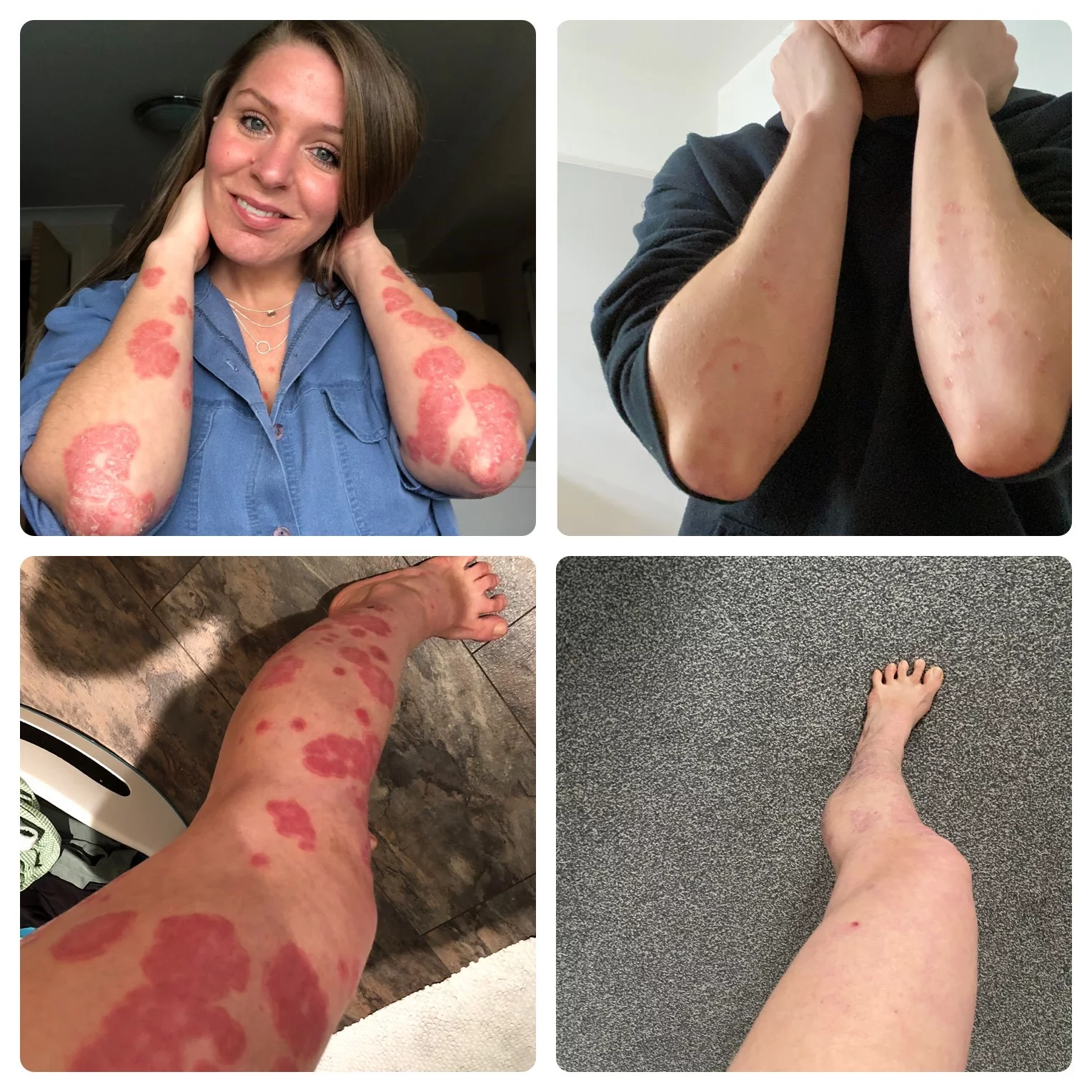

Sara Wilson
“I felt amazing, not only did my skin improve with each day, but my brain was also less foggy and my energy levels increased dramatically”
- Mental Health
- Skin Conditions


Matt Perry
“A simple test and re-education on your eating habits can turn your life around”
- IBS / Digestive Problems
- Tiredness / Fatigue
- Weight Management


Harriet Sturney
“This test has completely changed my life. Before, I didn’t go out often for meals and drinks. I lacked confidence due to my skin and I generally felt low.”
- IBS / Digestive Problems
- Skin Conditions


Trudi Stamp
“This has been a game changer! I was going round in circles before this test, not getting any answers from anyone. I wish I had know about this years ago, would've saved me years of pain and discomfort.”
- Arthritis / Joint Pain
- Brain Fog
- IBS / Digestive Problems
- Migraines / Headaches
- Nausea
- Tiredness / Fatigue
- Weight Management


Eleanor Newton
“ I couldn’t imagine going back to the life I had before this test! I’m so relieved I did it. You only get one body, so you need to look after it, and I’m so glad I made the decision to look after mine”
- Brain Fog
- IBS / Digestive Problems
- Weight Management

